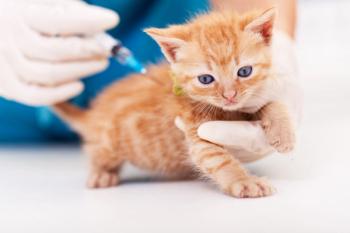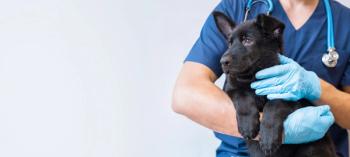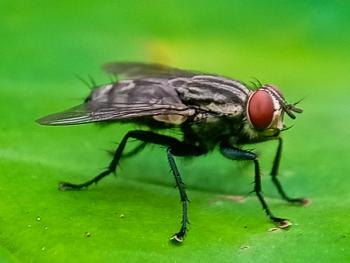
- dvm360 November 2024
- Volume 55
- Issue 11
- Pages: 12
An Army veterinarian’s unexpected journey
From the Army, to the veterinary clinic, to the classroom, Janice O’Brien, DVM, MPH, DACVMP, PhD candidate, and US Army veterinarian, shared key moments of her life story that led her to where she is right now
Janice O’Brien, DVM, MPH, DACVMP, and a United States Army veteran, did not always know she would pursue a career in veterinary medicine and research. However, after exploring materials science and engineering and working as a US Army veterinarian and rural practitioner, O’Brien is now a PhD student researcher at the Virginia-Maryland College of Veterinary Medicine in Blacksburg, Virginia, where she is studying canine nutrition and epidemiology.
Career beginnings
O’Brien first earned a bachelor’s degree in materials science and engineering from the Massachusetts Institute of Technology, Cambridge, in 2012 before going on to earn her doctorate in veterinary medicine from Purdue University in West Lafayette, Indiana, in 2016, while simultaneously completing a master of public health degree. “I think my core, driving interest has always been just trying to figure out how the world works, and to figure out how to learn how the world works, and so that’s what originally brought me to materials science and engineering,” O’Brien said in an interview with dvm360.
“But after I got into…doing some research as an undergrad…I learned about biopolymers and all the cool things that they can do. With my interest in the biopolymer aspect, and [because] I had always loved working with animals—I raised Seeing Eye dogs when I was in high school—I decided I might want to be a [veterinarian] and actually become a research [veterinarian]… and so I applied to veterinary school,” O’Brien continued.
The impact of military service
After graduating from Purdue, O’Brien served 5 years as a US Army veterinarian, primarily stationed at Fort Hood, Texas, later renamed Fort Cavazos. O’Brien shared that her military connections date back to her childhood, with her mother and grandfather also serving in the armed forces. “It’s kind of like a family thing, so I think I’ve always been around the military for my [entire] life, but to actually go in and be a service member is kind of a completely different ballgame,” O’Brien shared.
She also explained that her time in the military not only gave her practical epidemiology and real-world public health experience but also helped form her identity. “I think there’s a lot about who I am that is definitely impacted and influenced by my military experience,” she said.
Epidemiology in the Army
According to O’Brien, the practical experiences she had in the Army helped nurture her passion for epidemiology, although the interest was already there during her time in veterinary school. One event that gave O’Brien practical epidemiology experience during her time in the military involved a potential threat of an anthrax outbreak after the discovery of a bloated cow in one of the training areas at Fort Cavazos. O’Brien shared that the practical work varied, from obtaining a sample for testing to waiting for the test results and following specific protocols to avoid exposure. According to O’Brien, although the tests confirmed the substance was not anthrax, the situation provided her with real-life experience in the field.
“From one day to the next you’re like, ‘What am I going to have to respond to today?’ So I guess I got some epidemiology experience on the practical side of things, the…knowing and applying how diseases are spread, and telling people what they can and can’t do, or how worried they should or shouldn’t be about a particular thing,” O’Brien said.
Public health service
O’Brien explained that Army veterinarians are involved in extensive public health work, including conducting food inspections at military bases and commercial facilities, as well as responding to disease outbreaks and communicating important health information. During the COVID-19 pandemic, O’Brien and the surgical detachment unit she oversaw were one of the units that were sent to New York, New York, to help stand up the temporary hospital facility at the Jacob K. Javits Convention Center.
O’Brien shared that she enjoyed being part of this public health joint effort. “[The Army] was a lot of real-world experience on so many different fronts.… I think that that has really informed how I understand evident epidemiology research, and just to kind of understand the breadth of different experiences and things that people can have and where they can come from in their lives. So I think that was really important to make me a more understanding researcher,” she said.
Current projects
After leaving the Army, O’Brien spent some time in a rural, private small animal practice in Virginia before “feeling the need for transition,” which drew her to academia and research.
Now, as a PhD student, O’Brien hopes to address gaps in canine nutrition research by focusing on real-world feeding practices and their impact on pet health, rather than just clinical studies. With new large-scale data from projects like the Golden Retriever Lifetime Study, O’Brien hopes to better understand how nutrition affects the lives of everyday dogs.
One of O’Brien’s current projects involves analyzing data from the Dog Aging Project, focusing on how owners prepare homemade diets for their dogs, by coding this information into qualitative, usable data. Additionally, she is conducting a Lyme disease study, comparing the disease in dogs and humans.
Articles in this issue
about 1 year ago
Veterinary Heroes: Patricia Kennedy Arrington, DVM, CVFPabout 1 year ago
Veterinary Heroes: Camia Tonge, MS, LVT, VTS (SAIM)about 1 year ago
Veterinary Heroes: Karl Maritato, DVM, DACVS-SAabout 1 year ago
Veterinary Heroes: Susan V. Whittred, DVMabout 1 year ago
Veterinary Heroes: Adrianne Hiller, BSabout 1 year ago
Veterinary Hero: Khalfani CarrNewsletter
From exam room tips to practice management insights, get trusted veterinary news delivered straight to your inbox—subscribe to dvm360.






